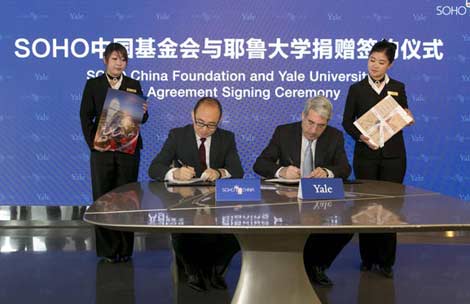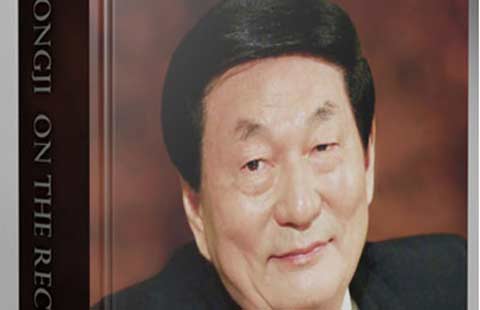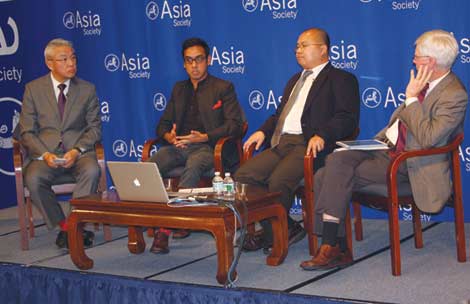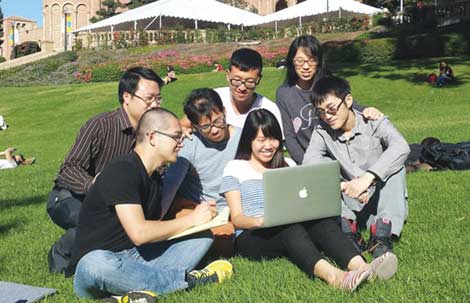Chinese turns to US for milk products
Updated: 2014-07-03 07:17
By AMY HE in New York(China Daily USA)
|
||||||||
Dairy consumption in the US has over the last decade has slowed, but demand from Asia — led by China — has been helping offset some of the US' milk woes.
US dairy consumption has been growing at an average of about half a percent a year for the last 10 years, but milk production has been increasing at about 1.5 percent. And the 1 percent difference between the two is going overseas, according to Jay Waldvogel, senior vice-president of strategy and global development of Dairy Farmers of America.
"The big change from the US perspective is that their (China's) appetite has gotten to a size where it's a matter of making certain they have certain access to enough products, or being certain they have access to a diversity of supply bases. Their attention has moved much more aggressively, proactively to supply in the last few years," Waldvogel told China Daily.
New Zealand is the world's largest milk exporter and supplies China with whole milk powder, the dairy product that makes up the majority of China's imports. But it suffered a drought last year, pushing milk prices to record highs and made China realize it couldn't depend on one source, Alan Levitt, spokesman for the US Dairy Export Council, said.
The US exported more than $700 million worth of dairy products last year to China, up from the $116 million in 2006, Levitt said. Exports dropped off during the financial crisis in 2009, but picked up the year after and have taken off ever since, he said.
A number of factors are driving China's growing consumption of milk and other dairy products: China now has a middle class that can afford more dairy products, and more attention is being paid to the health benefits of milk. In tandem, the Chinese government has slowly introduced dairy into school meals, and as the country becomes more urbanized, families are feeding their kids more with milk.
Meanwhile, China's 2008 milk scandal — when infant formula sold by Chinese companies were found tainted with melamine — hurt consumers' confidence in domestic food safety, driving customers to buy infant formula from overseas sources and giving a leg up to foreign importers.
In addition, China's own dairy output — about one-third of the US output — is more like an informal sector and provides milk for perishable foods like yogurt, Levitt said.
"It was small, individual families with their few cows and taking it to some collection center. They weren't set up to do big large-scale farming that would be required now. So the demand sort of outstripped what they structurally were set up to do," he said.
The lack of arable land proportional to the size of the country puts China at a disadvantage, making dairy production at home more expensive.
"You can look at it this way: just like you could grow oranges in Wisconsin, it isn't practical to do so. It makes more sense to grow oranges in Florida and ship them up to Wisconsin. It's just the way free markets work; it's cheaper to do that," Levitt said. "In China, because of constraints with having the feed necessary, and the lack of arable land relative to population and environmental issues, it's very expensive to produce milk in China. It's cheaper for them to import milk powder and turn it into the products that they need, rather than produce all the milk that they need themselves."
Whatever opportunity US dairy farmers might have had when bad weather hit other parts of the globe, they're trying to stay competitive. The US has historically been absent from the whole-milk powder market, which farmers have been trying to fix in the last few years. The Dairy Farmers of America opened a new whole-milk powder-making plant in Nevada, which will ultimately produce products to a variety of customers, but the impetus behind the creation of the plant was to serve the Chinese, Waldvogel said.
"What you see now and what has emerged over the last number of years is the US making investments to produce what the market — and in this case, the Chinese market — wants," he said. "And second, we're building the right customer relationships. You're not in China simply trying to say, ‘Here's a bag of milk powder', but rather that you have a real relationship with customers."
- Xinjiang publishes anti-terror brochures
- Security pact sealed with Afghanistan
- President Xi encourages international cultural exchanges
- Premier Li: China willing to help Afghan infrastructure
- Chinese FM: China, Asia-Pacific become community of shared destiny
- Foreign minister remarks on possibility of China-Japan summit
Most Viewed
Editor's Picks

|

|

|

|

|

|
Today's Top News
VW defends safety of recalled New Sagitar
Former premier makes Hurun philanthropists list
Xinjiang publishes anti-terror brochures
SOHO endows $10m to Yale
Cook and Ma talk about partnership
Language a barrier to healthcare for Asian Americans
China businesses need innovation: VC
Security pact sealed with Afghanistan
US Weekly

|

|















